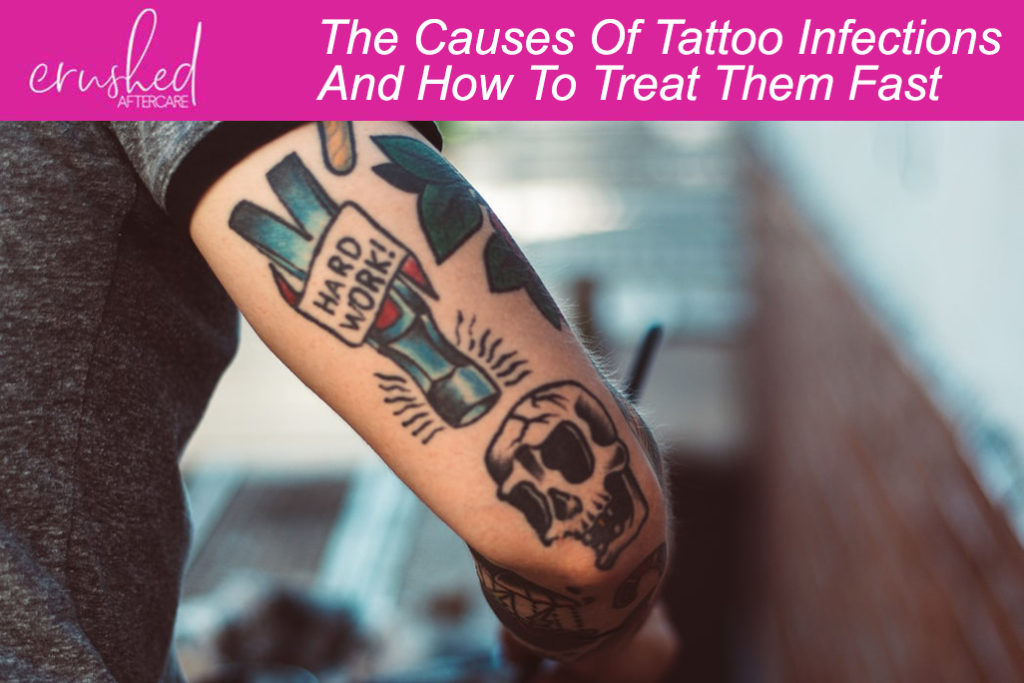
The Causes Of Tattoo Infections And How To Treat Them Fast
Tattoos can take up to six weeks to heal, and for most people, these six weeks are relatively smooth. When the artist uses clean needles in a good environment, the client shouldn’t have to worry about infections if they follow proper aftercare instructions. But even their best intentions can fail! Here’s what causes tattoo infections, and how your clients can treat them quickly.
What Causes Tattoo Infections?
 Tattoo infections start when a pathogen – a disease-causing bacteria or virus that isn’t supposed to be there – enters the wound. Several types of pathogens can cause an infection, including staphylococcus and streptococcus, and while some respond to antibiotic treatments, others do not. They can infect the area in two ways: through contaminated equipment and ink or improper aftercare.
Tattoo infections start when a pathogen – a disease-causing bacteria or virus that isn’t supposed to be there – enters the wound. Several types of pathogens can cause an infection, including staphylococcus and streptococcus, and while some respond to antibiotic treatments, others do not. They can infect the area in two ways: through contaminated equipment and ink or improper aftercare.
The signs of an infected tattoo will be well-known to the client, even if it’s their first tattoo. The best sign that they need immediate attention is if pain and sensitivity that lasts more than a few days. Other symptoms include redness, warmth, rashes, swelling, and tenderness. Itchy, painful bumps on the tattoo are a sign of an atypical mycobacterial infection.
Clean tools are essential for preventing infection, and any tattoo artist reading this article knows it for a fact. But artists can’t control what happens outside their studio, and six weeks can feel like an eternity for people who want to show off their new ink. If the client rushes it, they could leave themselves open to infections!
Treating Tattoo Infections
 Clients with infected tattoos should seek help from their artist and a dermatologist or their regular doctor. The doctor can prescribe oral or topical antibiotics to clear it up. Depending on the severity of the case, antibiotic treatment can last for weeks or even months.
Clients with infected tattoos should seek help from their artist and a dermatologist or their regular doctor. The doctor can prescribe oral or topical antibiotics to clear it up. Depending on the severity of the case, antibiotic treatment can last for weeks or even months.
The doctor considers the best course of treatment based on the situation. They may do a biopsy where they take a sample of the tissue to see what bacteria or virus is causing the infection. Sometimes an existing skin condition like psoriasis, eczema, contact dermatitis can inflame the area and make an infection more likely. This is nothing to worry about, and a dermatologist can prescribe the right treatment.
Even if a tattoo infection requires long-term antibiotic treatment, it usually isn’t something to worry about. Clean needles and ink used in a sterile environment won’t cause any serious health problems. As long as the client gets medical attention as soon as they feel something off about the tattooed area, most infections will clear up without any long-term effects. The client might need a touch-up, though!
Preventing Tattoo Infections
 The good news is that most tattoo infections are easy to treat; the better news is that they are easier to prevent! In the weeks following the removal of the bandage, it’s important that clients keep the tattooed area clean, moist, and protected, because the skin can still be susceptible to infection. For the sake of the skin and artwork, they have to resist picking at or scratching the area while it heals. The proper aftercare product can keep their tattoo looking and feeling healthy until it has fully healed.
The good news is that most tattoo infections are easy to treat; the better news is that they are easier to prevent! In the weeks following the removal of the bandage, it’s important that clients keep the tattooed area clean, moist, and protected, because the skin can still be susceptible to infection. For the sake of the skin and artwork, they have to resist picking at or scratching the area while it heals. The proper aftercare product can keep their tattoo looking and feeling healthy until it has fully healed.
Sending your client home with a natural, vegan aftercare product can help the area heal while preventing common post-care problems. Ingredients like calendula oil and candelilla wax won’t cause inflammation and outbreaks, too. Crushed Aftercare’s tattoo balm uses these and many more plant-based ingredients to minimize scabbing, keep the area moist, and protect the vibrancy of your client’s new tattoo!






